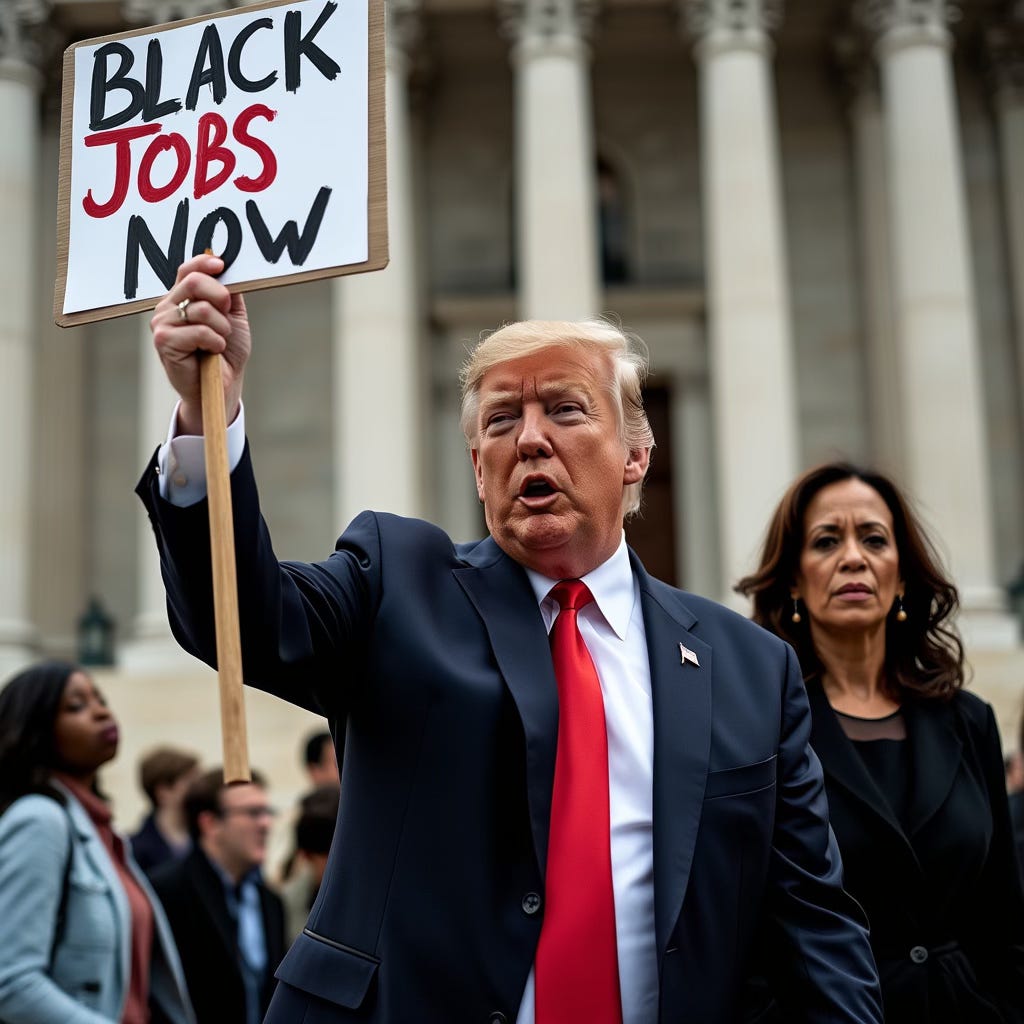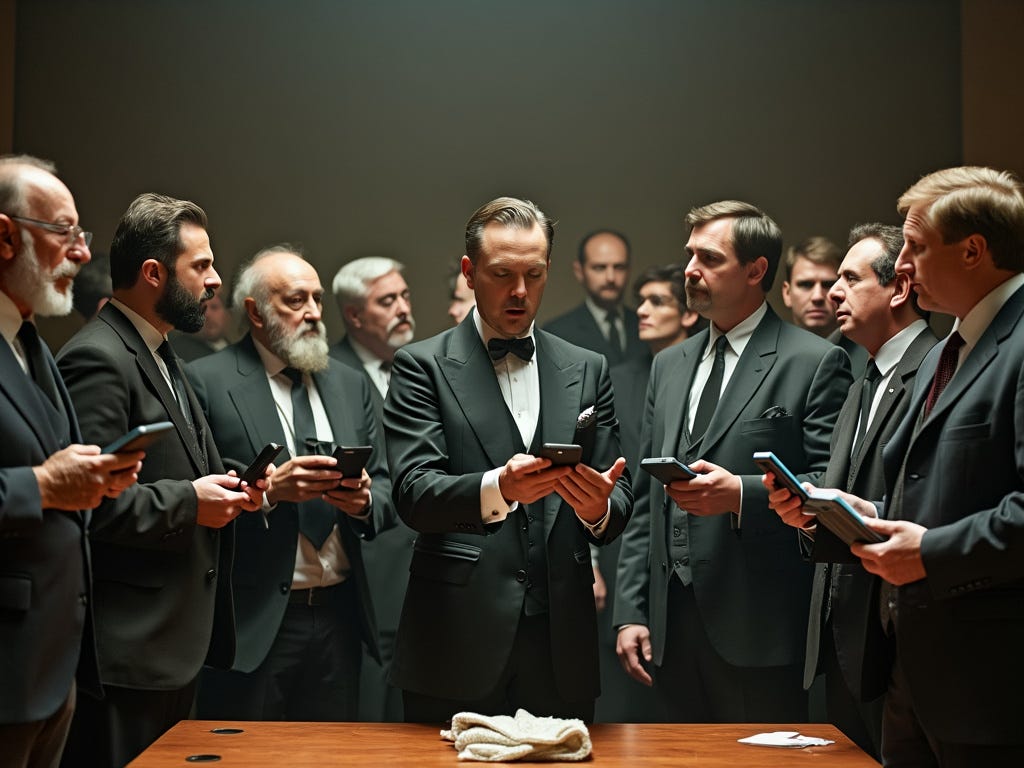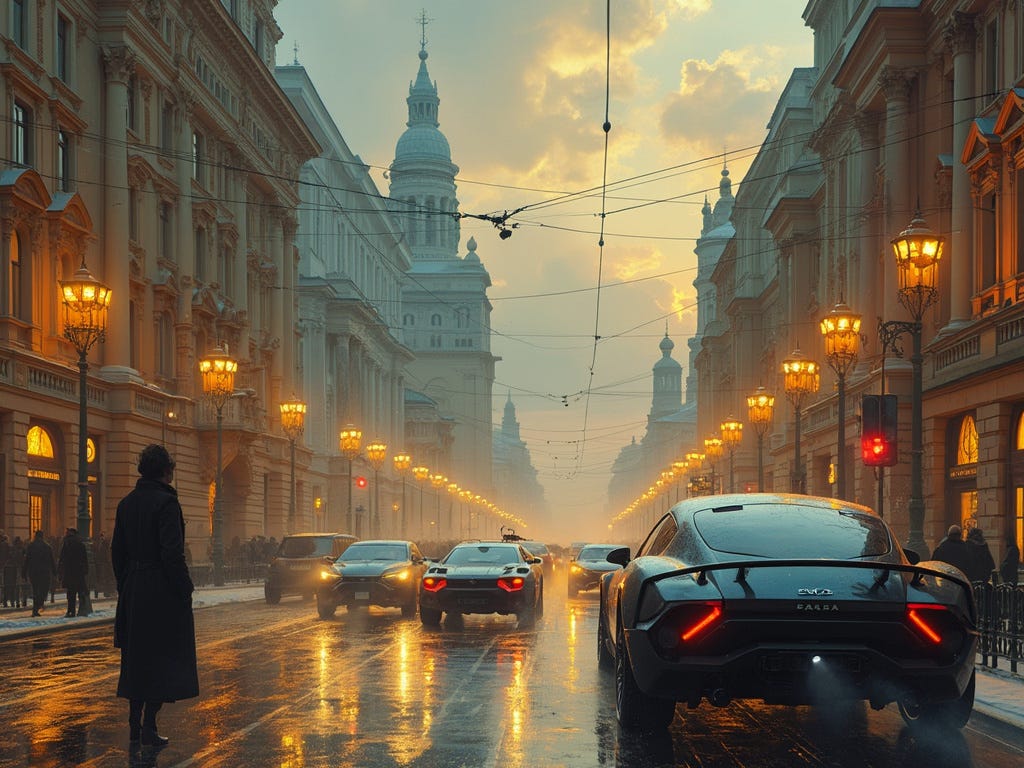The Dead Souls Reader: A Gogol-Inspired Guide to AI-Induced Unemployment
In the News: Trump on “Black Jobs” | Texas Blocks Basic Income | Intel Fires Thousands in AI-Fueled Purge || Bonus Content! Code & Context's “Summer of AGI” Reading List
Introduction: Catching a Dead Soul at Work
A sturdy horse-drawn carriage–the britzka–rattles along a dusty road, its leather creaking in protest against the relentless Russian sun. Inside, Pavel Ivanovich Chichikov, a man of dubious charm and boundless ambition, surveys the passing landscape with a calculating eye. He's on a quest to acquire a most peculiar commodity – the souls of deceased serfs, their names inscribed on official documents, their absence in the physical world a technicality to be exploited for personal gain.
Fast forward to today, and a new, futuristic soul-harvest has begun. Bustling distractedly through the hushed arrivals terminal at Baltimore-Washington International Airport, I trip past a robotic floor cleaner, its methodical movements tracing a gleaming path through the just-landed crowd. The weary travelers, eyes red from overnight flights, barely mark the machine as it works, its presence both unremarkable and strange.
There is irony here. I'm returning from a vacation trip to Seattle, the home of tech giants like Microsoft and Meta, companies at the forefront of AI. Their work is accelerating technologies that will make human jobs – perhaps even the job of the person who once pushed that cleaner across the airport floor – obsolete.
As I observe this automated janitor, I can't help but wonder: how many "dead souls" of displaced workers does it represent? How many more will it collect as it tirelessly scrubs the floors, never needing a break, never asking for a raise, never calling in sick?
This scene, playing out in an airport that serves as a gateway between the East Coast and the tech meccas of the West, becomes a poignant metaphor for our AI-driven future. It's a future where the fruits of Silicon Valley's labor ripple across the country, reshaping the landscape of employment in ways both subtle and profound.
As we stand on the precipice of an AI revolution, are we not, in our relentless pursuit of technological progress, replicating Chichikov's strange quest on a global scale? Instead of dead serfs, we could be amassing a collection of "dead jobs" – tasks and professions rendered obsolete by the inexorable advance of AI, their human essence stripped away, leaving behind only the ghostly outlines of algorithms performing their duties with inhuman efficiency.
In this article, we'll compare Nikolai Gogol's satirical masterpiece, "Dead Souls," and the current AI-driven transformation of the job market. Through the lens of Gogol's wit and social observation, we'll examine the human cost of automation, the illusion of control in our AI systems, and the potential for a fragmented, alienated workforce. But fear not, dear reader – like Gogol's satire, our journey will be peppered with dark humor and, ultimately, a glimmer of hope for the future.
Modern Chichikov: AI as the Collector of "Dead Jobs"
Like Chichikov, who saw opportunity in the neglected and forgotten corners of society, AI is poised to exploit the vulnerabilities of a workforce struggling to adapt to the rapid pace of technological change. A recent White House analysis found that roughly 1 in 10 US workers are employed in jobs highly susceptible to disruption from AI's rapid evolution. This unsettling figure underscores a growing anxiety amongst workers: a survey revealed that a staggering 86% fear losing their livelihoods to AI.
Cities like Austin, Texas, with its burgeoning tech scene, face a particularly acute risk, with an estimated 126,000 workers – budget analysts, loan officers, accountants, and others – vulnerable to AI-driven displacement. It's a modern-day collection of "dead souls," with AI playing the role of Chichikov, acquiring the essence of jobs once performed by humans.
But unlike Gogol's satirical protagonist, who sought personal gain at the expense of others, we have the opportunity to shape a different narrative – one where AI's transformative power is harnessed for the benefit of all, rather than leaving behind a trail of "dead souls" in its wake.
Akaky's Overcoat: The Human Cost of Automation
Consider Akaky Akakievich Bashmachkin, the downtrodden protagonist of Gogol's "The Overcoat." A lowly clerk, his entire existence revolves around his monotonous work, his life as bleak and colorless as the bureaucratic papers he shuffles. The theft of his cherished overcoat, a symbol of his meager dreams and aspirations, shatters his fragile world, leaving him lost and forgotten in the cold indifference of society.
In the sterile glow of a modern factory floor, where robots weld and assemble with tireless precision, one can almost hear the echo of Akaky's despair. The factory worker, once the backbone of industrial production, now finds himself increasingly redundant, his skills rendered obsolete by the cold logic of automation.
This displacement isn't limited to blue-collar workers. Even in the gleaming towers of Silicon Valley, the tremors of AI-driven job loss are being felt. Intel, once a titan of the semiconductor industry, recently announced a significant downsizing, laying off 15,000 employees – a move driven by both financial struggles and a need to adapt to the rapidly changing landscape of AI-powered computing. It's a cruel irony: even as Intel invests heavily in AI, its own workforce is being reshaped by the very technology it strives to master.
The Inspector General: AI and the Illusion of Control
Gogol's satirical play, "The Inspector General," lampoons the corruption and incompetence of officials, a theme that finds unsettling resonance in the age of AI. As we entrust ever more complex tasks to algorithms – from medical diagnoses to financial trading – we risk replicating the farcical chaos of Gogol's play, where mistaken identities and misplaced trust lead to disastrous consequences.
Are we not, in our rush to embrace AI's promises, overlooking the potential for these systems to be manipulated, their decisions skewed by biases hidden within their code, their pronouncements as hollow and unreliable as the pronouncements of Gogol's inept officials?
This illusion of control extends to the political sphere, where AI's impact on the job market becomes fodder for divisive rhetoric. Take, for instance, former President Donald Trump's recent claim that immigrants are stealing "Black jobs" and "Hispanic jobs." This assertion, as misguided as it is inflammatory, distracts from the real threat of job displacement – not from human immigrants, but from the tireless, ever-advancing armies of AI.
Lawmakers, activists, and economists were quick to debunk Trump's theatrical display of economic scapegoating. As they pointed out, the job market for Black workers has been thriving in recent years, with record-low unemployment rates and steady wage gains. Immigration, far from being the job-stealing villain in Trump's theatrical production, has generally had a positive impact on the economy, benefiting workers of all backgrounds.
Yet, while Trump's pronouncements might be dismissed as mere political theater, they tap into a deeper and more legitimate anxiety about economic insecurity, particularly for minority communities. And here, the specter of AI looms large, casting a long shadow over the future of work for all Americans, but particularly for those already facing systemic disadvantages.
Nevsky Prospect: The Fragmented AI Workforce
Gogol's "Nevsky Prospect," a tale of dreams and disillusionment, paints a vivid picture of a fragmented society, where individuals chase fleeting illusions, their lives disconnected and adrift. The story's haunting depiction of urban alienation mirrors the growing anxieties of a workforce increasingly fragmented by AI-driven changes.
As remote work becomes the norm and gig economy jobs proliferate, are we not witnessing a new kind of social fragmentation, where human connections are replaced by virtual interactions, and the sense of shared purpose erodes, leaving workers isolated and vulnerable?
The gig economy, often touted as a beacon of flexibility and opportunity, may well be a precursor to a fully AI-driven job market. As tasks become increasingly atomized and automated, workers may find themselves competing not just with each other, but with AI systems capable of performing a wide array of jobs with tireless efficiency.
The Diary of a Madman: Identity Crisis in the Age of AI
The protagonist of Gogol's "Diary of a Madman," driven to insanity by the soul-crushing monotony of his clerical job, offers a chilling premonition of the potential psychological toll of AI-driven job displacement. As algorithms take over routine tasks, many workers may find themselves facing a similar existential crisis.
The sense of purpose and meaning derived from work, a cornerstone of human identity, may vanish, leaving behind a void that can't be filled by endless leisure or the pursuit of fleeting digital distractions. This crisis of identity extends beyond individual workers to entire communities built around specific industries or skill sets. As AI reshapes the job market, how will we redefine our sense of self and our place in society?
Beyond Dead Souls: Navigating the AI Revolution
As we navigate the uncharted waters of the AI revolution, it is essential to remember that technology is not an end in itself, but a tool to enhance human potential and create a more just and equitable society. By embracing a holistic and ethical approach to AI development, we can navigate the challenges of automation and create a future where technology serves the common good, rather than leaving behind a trail of 'dead souls' in its wake.
To achieve this, we must focus on several key areas:
Investing in Education and Reskilling: We must equip workers with the skills necessary to thrive in an AI-driven economy, embracing lifelong learning and adaptable skill sets.
Promoting Ethical AI Development: Ensuring that AI technologies are developed and deployed ethically is crucial to prevent unintended consequences and societal harm.
Exploring New Economic Models: As AI reshapes the economic landscape, we must consider new models like Universal Basic Income to mitigate the potential for widespread job displacement and ensure a more equitable distribution of AI's benefits.
Preserving Human Creativity and Connection: As AI takes over routine tasks, we must place greater value on uniquely human skills like creativity, empathy, and complex problem-solving.
By drawing upon the wisdom of literary works that grapple with the timeless questions of human purpose and societal change, we can better understand and address the challenges posed by AI. Gogol's satirical lens offers us a powerful tool for examining our own society's foibles and follies as we hurtle towards an AI-driven future.
Conclusion: A Call for Human-Centered AI
As we stand at the crossroads of this technological revolution, let us heed the warnings embedded in Gogol's satire. Like the landowners of "Dead Souls," we must not be so blinded by the promise of progress that we lose sight of our humanity. Instead, let us strive to create a future where AI enhances rather than replaces human potential, where technology serves as a tool for empowerment rather than displacement.
The challenges ahead are significant, but so too is our capacity for innovation, adaptation, and compassion. By fostering a human-centered approach to AI development and deployment, we can write a new chapter in our technological history – one where the Chichikovs of the AI world collect not "dead souls," but opportunities for growth, learning, and shared prosperity.
As we navigate this brave new world, let us carry with us the sharp wit and keen insight of Gogol, using satire as a mirror to reflect our own follies and aspirations. For in laughter, we may find the wisdom to chart a course through the choppy waters of the AI revolution, towards a future that honors the fullness of human potential in all its glorious, messy complexity.
Bonus Content! Code & Context’s Summer of AGI Pre-Apocalyptic Reading List
As we contemplate the challenges and opportunities of our AI-driven future, what better way to prepare than by immersing ourselves in the prophetic visions of literary lions? Here's a carefully curated reading list to get you through the dog days of summer and beyond:
Nikolai Gogol, "Dead Souls": The satirical masterpiece that inspired this article. A must-read for understanding the absurdities of bureaucracy and the commodification of human life.
Nikolai Gogol, "The Overcoat": A poignant tale of alienation and the struggle for dignity in a cold, indifferent world.
Franz Kafka, "The Metamorphosis": A surreal exploration of dehumanization and alienation in the face of societal pressures.
Aldous Huxley, "Brave New World": A chilling vision of a technologically advanced society where happiness comes at the cost of individuality and free will.
George Orwell, "1984": The classic dystopian novel that warns of the dangers of totalitarian control and the manipulation of truth.
Mary Shelley, "Frankenstein": A cautionary tale about the ethics of creation and the responsibilities that come with technological advancement.
Ray Bradbury, "Fahrenheit 451": A powerful exploration of censorship and the importance of preserving knowledge and critical thinking.
Arthur C. Clarke, "2001: A Space Odyssey": A visionary tale of human evolution and the potential dangers of artificial intelligence.
Kurt Vonnegut, "Player Piano": A satirical look at a future where automation has rendered human labor obsolete.
Isaac Asimov, "I, Robot": A collection of stories that explore the ethical implications of artificial intelligence and robotics.
As you dig into these literary worlds, consider how their themes and warnings resonate with our current technological landscape. May these works inspire critical thinking, foster empathy, and guide us towards a future where technology enhances rather than diminishes our humanity.
Related Reading in the News
AI and Job Displacement
AI employment impact: 86% of workers fear job losses, but here's some good news (ZDNet)
Report: 126K Austin-area jobs at high risk of being impacted by AI (KVUE)
AI is replacing workers faster than many expected. Here's what that means for your job (CNN)
Chipmaker Intel to cut 15,000 jobs as it tries to revive its business (AP News)
Adapting to an AI-Driven Job Market
5 Ways to Future-Proof Your Career in the Age of AI (Harvard Business Review)
Workplace Skills That Will Survive the AI Revolution (Learnosity)
AI Survival Guide: 5 Strategies to Stay Relevant in an Evolving Business Landscape (Logic Manager)
How New Grads Can Find a Job in the Age of AI (U.S. News & World Report)
Policy and Economic Solutions
AI and Jobs: 4 Key Steps Governments Can Take to Limit Job Displacement (AI for Good)
What To Do About AI-Driven Job Displacement (People's Policy Project)
Should U.S. Implement a New Tax on AI to Fund Worker Benefits? (Bloomberg)
AI is coming for our jobs. Could universal basic income be the solution? (The Guardian)
South Dakota, Texas Block Local Universal Basic Income Laws (Bloomberg)
AI Ethics and Governance
AI Will Transform the Global Economy. Let's Make Sure It Benefits Humanity (IMF)
Pope asks world's religions to push ethical AI development (USCCB)
Governance's Role In Shaping Responsible AI Development (Forbes)
Trump on Black Jobs
AP FACT CHECK: Trump on 'Black Jobs' (Associated Press)
Critics Baffled by Trump's 'Black Jobs' Claim (Yahoo News)
FACT FOCUS: Trump wrong that immigrants are taking jobs from Black workers (Associated Press)










